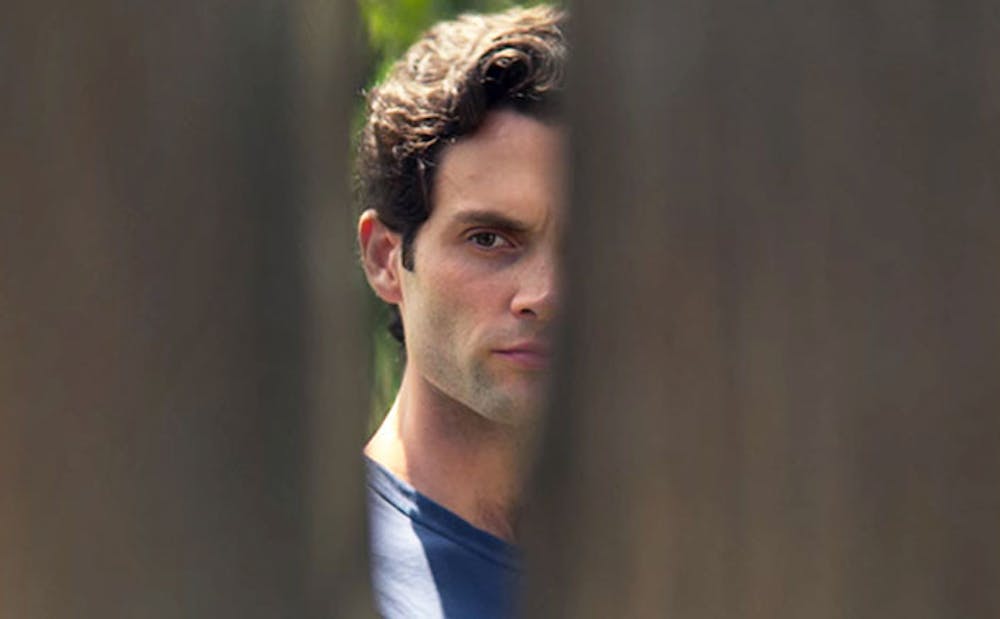(Warning: this article contains spoilers from season 1 of Netflix’s “You”.)
Thirty minutes into the first episode of “You”, we still believe protagonist Joe Goldberg to be the perfect man. He’s got “Gossip Girl” actor Penn Badgley’s stunning good looks, he’s the charming, mild-mannered manager of a quirky NYC bookstore, he saves his love interest from being crushed by a subway train… what’s not to like?
Then he pockets said love interest’s phone, breaks into her apartment, steals her dirty underwear and locks her boyfriend in a Plexiglass cage. Things progress steadily downhill from there.
The third season of “You” was released Oct. 15th to widespread acclaim. The Lifetime-turned-Netflix TV series follows Joe as he stalks and then dates various women, killing anyone who gets in the way of his romantic pursuits (and, once he tires of them, often the women themselves).
It’s a horror story: a cautionary tale demonstrating the dangers of ignoring red flags on a first date, of posting your entire life to social media and of opening strange boxes you find in a hole in your boyfriend’s wall (RIP Beck). Joe Goldberg is a monster. If he existed in real life, the natural human instinct would be to stay as far away from him as possible.
Why, then, are so many fans lusting after him?
“[Joe]’s not creepy, he’s in love with her and it’s okay. By the way, I know everybody is gonna say ‘Ahhh, he’s a stalker, why would you support that?’ But like, he’s in love with her,” said “Stranger Things” actress Millie Bobby Brown about the show’s first season back in 2019. In the years since, her thoughts have been reiterated by thousands of Joe-obsessed fans in the form of thirst tweets, fancams and, horrifyingly, Joe Goldberg x Reader self-insert fanfiction. Things got so bad that Penn Badgley himself had to step in and politely ask fans to stop sexualizing his character.
TV viewers thirsting after villains is a tale as old as time. The television industry has practically accepted it as fact — from “Dexter” to “Hannibal” to “Killing Eve”, countless hit series have spawned from the simple premise of “Really Hot Person That Likes To Commit Murder”. One of the most thriving genres of the twenty-first century is “true crime:” reenactments of infamous criminal acts, with the perpetrators’ looks improved and humanizing factors exaggerated. Needless to say, most fans of the genre aren’t attracted to it because of their vested interest in the American legal code. (For example, take the time Netflix released a semi-official statement calling out fans of its true crime documentary “Extremely Wicked, Shockingly Evil and Vile” for their uncomfortable sexual comments about serial killer Ted Bundy, played in the film by “High School Musical” heartthrob Zac Efron.)
But what’s the motivation behind the love for Joe Goldberg? Outside of a few niche cases, it’s definitely not a reflection of fans’ real-life romantic desires; I’m pretty sure the average “You” fan wouldn’t be happy if they found out their IRL significant other was secretly a stalker planning to make their death look like an accident. Maybe it stems from a misguided desire to “fix him,” or because it plays on our deep-seated need to feel wanted, even if at a great cost.
Or maybe it’s because we’re in his head. “You” portrays the life of Joe Goldberg through a uniquely distorted lens: his own eyes. Not a scene goes by without Joe’s internal monologue playing over it, justifying his actions while playing up the unlikeable traits of the people around him. “You” goes out of his way to show examples of Joe’s “sensitive side” (such as him being good with kids and his angst over his troubled childhood), while many of his more gruesome deeds happen entirely offscreen.
Through careful editing choices, we are shown Joe the way he sees himself — as an ideal man who’s fallen victim to unfortunate circumstances — and, as the show goes on, we begin to unconsciously sympathize with the faulty logic Joe uses to rationalize his identity as a great boyfriend. This makes it all the more jarring the few times we see Joe through someone else’s point of view (like the aforementioned scene where Joe’s Season 1 girlfriend Beck finds his box of artifacts from the people he’s murdered and discovers she’s been dating a psychopath). For a brief moment, the wool over our eyes is pulled back, and we realize with horror the extent to which we as the audience have been duped by his charm. Then, five minutes later, we’re trapped again in Joe’s carefully-curated view of the world, and we’re under his spell once more.
Get The Chronicle straight to your inbox
Signup for our weekly newsletter. Cancel at any time.

